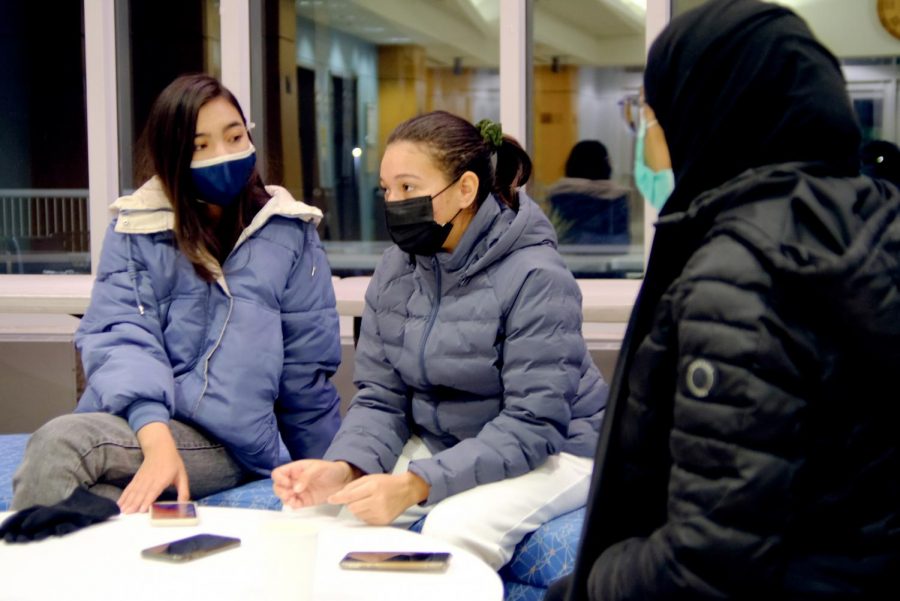Students discuss awareness in diversity on campus
Gulaiym Bolatova, Nicold Bazán and Fatimah Albahrani drink lassi and chat in the Liberal Arts Building during Diwali: The Festival of Lights hosted by South Asian Student Association Nov. 4, 2021.
November 16, 2021
A young woman attends a campus open dialogue event concerning Latinidad issues.
Veronica Portillo, a senior health services and communication studies major, feels uncomfortable in this setting as she does not fit the stereotypical description of a Mexican. She worries she will be shut down for her light skin and lack of fluency in Spanish.
“I just think USI should have more conversations about stereotyping,” Portillo said. “You know, misclassification and identity.”
Portillo said people assume she is Italian because of her last name in combination with her light skin, and she feels pressured to choose between her two identities.
“They’re like, ‘Well, you can’t be Hispanic you’re white,’” Portillo said. “Or you know, I look white, so that’s all I can be.”
This pressure to choose between two identities forces people to erase a part of who they are, Portillo said. The United States is a melting pot, but people are only seeing a whitewashed representation of themselves.
To counter the pressure she feels, Portillo said she is embracing her family’s heritage by learning about her background. She is also president of USI Spanish Club.
“A lot of people think that diversity is just learning about another culture,” Portillo said. “But I feel like you have to put yourself out there to learn about the history and to learn about these different identities and the issues that come with those.”
Anmoldeep Singh, junior biochemistry major, was born in India and spent his early childhood years in New York City. He said moving to Indiana was a culture shock since he was used to being surrounded by diversity.
Singh said he was at first surprised by the lack of diversity on campus, and he felt left out because people at the university are predominantly white. However, once he looked for diversity, he said he quickly realized inclusion is a big message at the university.
“I have found you kind of have to look for it,” Singh said. “And when you do, you can find a lot of diversity and definitely a lot of different organizations and groups of people.”
Singh said it was not a bad thing the university was different than he expected. He said he still wants the university to promote and bring more awareness to diverse campus organizations.
“I don’t think it’s a huge issue, but I think it’d be nice to have events to promote knowledge and awareness of different backgrounds,” Singh said.
Singh said he started the South Asian Student Association on campus to bring more awareness about South Asian culture.
“I think this organization is definitely a step in the right direction because I think diversity is always a good thing,” Singh said.
Phoebe Cornell, a junior social work major and gender studies minor and president of Sexuality and Gender Alliance, said the university needs to promote the LGBTQ community.
“We don’t have a lot of visual representation,” Cornell said. “For example, you don’t see anything on campus that tells you this is a safe space or this is a LGBT inclusive campus.”
Cornell said creating safe study spaces, gender neutral bathrooms and hiring diverse staff in the counselling center and as professors would create a welcoming environment. They said students of diverse backgrounds won’t feel represented since all of the staff seems to fit the same mold.
Cornell said the classes for her gender studies minor are understaffed, and she doesn’t know when she’s going to be able to finish her minor. “And these are classes that actually teach about diverse experiences,” they said.
Professors also need to be careful when publicly asking students’ pronouns, Cornell said. This may be forcing a trans person to out themselves in an environment they’re not comfortable with doing so.
To be respectful of pronouns, Cornell said professors should encourage sharing pronouns over email instead of asking in front of the whole class.
“I think it’s just a lot of being aware,” Cornell said. “You may not always realize what’s going on around you, but taking note of someone’s pronouns can be a very simple action that makes someone feel better.”







